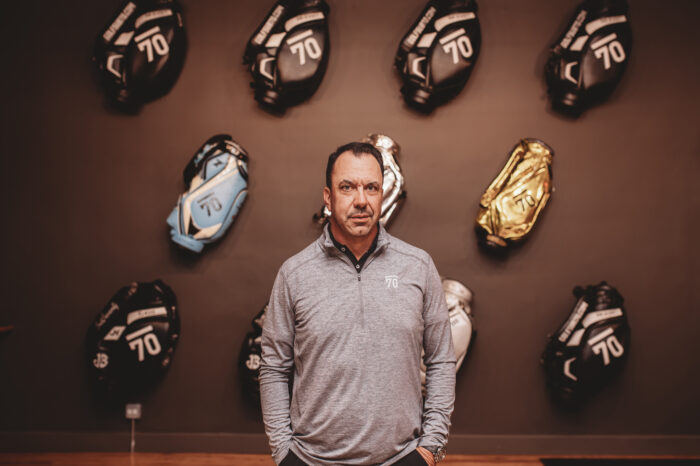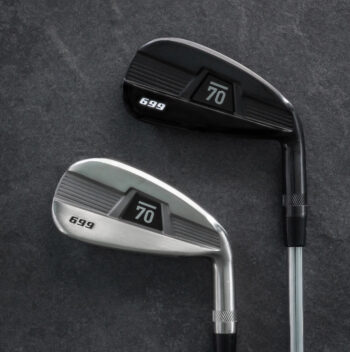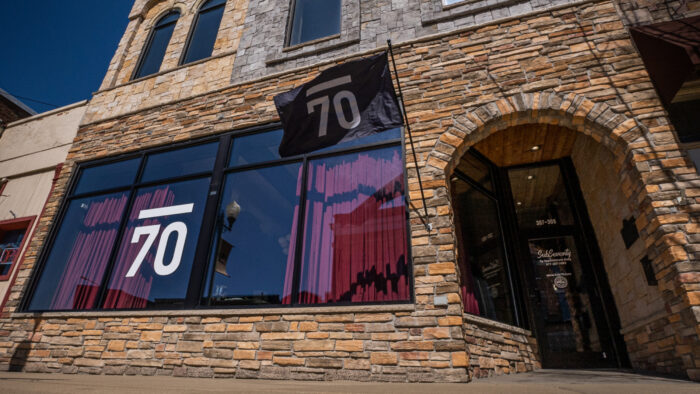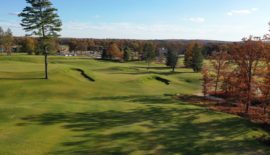Sub 70’s direct-to-consumer business model making big waves in clubmaking industry
Most days, Jason Hiland confesses, you’ll find him in a hat and hoodie, huddled over the latest design in the Sycamore, Illinois, office of his upstart Sub 70 golf manufacturing brand.
“I don’t wear a suit very often because, you know, we’re kind of like, Internet guys, so I’m usually in high tops, a hoodie and a flat bill, right?” Hiland laughs. “No one sees me.”
Au contraire. The entire golf industry is sitting up and taking notice of Sub 70’s meteoric success since its inception in 2018, with its custom-built clubs made to fit and shipped directly to its customers. Since its launch Sub 70 has quickly made waves in a market long dominated by big-brand, big-box-style sales models. The company is now well known for its premium-quality products at affordable prices, due in large part to its D2C (that’s direct-to- consumer) business plan that cuts out the middle man and keeps everything custom to the buyer.
Initially known for its players’ irons (aimed at the high single-digit handicapper), Sub 70’s earned a warehouse full of accolades for everything from its “001” blade putters (named to My Golf Spy’s “Most Wanted” 2023) to its drivers, woods and wedges, becoming the world’s No. 1 D2C clubmaker in the process.
Hiland, who’s been a pioneer in the golf industry since starting his discount retailing website Diamond Tour Golf after graduating from Wisconsin-Oshkosh in the late ’90s, realized the clubmaking industry was ripe and ready for a change.
And hoodie and hightops aside, it was Hiland’s sense of style that made him realize — quite literally — that the timing was just right.
“It kind of started with the success of (direct-to-consumer watch company) Shinola,” Hiland explained. “And how cool that story was. They started the revival when downtown Detroit was starting to get redone. That story just spoke to me.
“I’ve always kind of used that mindset, you know, ‘How do we make things more efficient?’ And then by using tech and just having that relationship with the customer, they can get this really cool high quality watch. One that has great branding and you’re proud to wear it. But, you know, it doesn’t have to cost $6,000, very reasonably priced but no compromise on quality. That part was cool, and it just had a cool vibe to it. So I like that story.”

Sub 70 founder Jason Hiland is a Midwest man through-and-through, growing up in Illinois and attending Wisconsin-Oshkosh before immediately starting a series of golf businesses.
While Hiland’s stylistic inspiration may have come from the Motor City’s famous timepieces, it was another clothier that convinced him the golf industry was ready for something different.
“What really got me over the edge, was when I needed a new suit,” Hiland said. “You know, I don’t want to wear a shady suit, right? Like we’re going out in Chicago and I want the suit to fit nice and look nice, but I don’t want to spend $1,000 on a suit because I’m not going to wear it that much?
“So, I’m watching CNBC one morning and the founder of Combatant Gentlemen is on there. And he basically worked in the industry and then decided to start a suit company that they sold directly to the consumer.
 “But the suit was like 180 bucks, and his argument is like when you buy like a $1,000 Hugo Boss suit, you’re paying more for the marketing and Fashion Week on 5th Avenue showroom than the actual cost of the suit.
“But the suit was like 180 bucks, and his argument is like when you buy like a $1,000 Hugo Boss suit, you’re paying more for the marketing and Fashion Week on 5th Avenue showroom than the actual cost of the suit.
“So, and the brand was kind of cool. I was like, OK, I get where this guy’s coming from. Then it was OK, if I’m willing to buy a suit this way and not feel that the brand is cheap, people will buy golf clubs that way.
“It pushed me over the edge of like, this is the future. This is how you go.”
Sub 70 was born, the love-child of new tech and old school cool. But it wasn’t an overnight success — it was one 25 years in the making.
“Well, yeah, I mean we had Diamond Tour Golf and Hurricane Golf, which were successful companies, you know,” Hiland explained. “I made a nice living, and could definitely make that a career. You know, I start Diamond Tour Golf in ’95 after school in Oshkosh, as a golf component company. We still have Diamond Tour. And when the Internet was coming out, our first web- site was in ’96 and then in ’08, we started Hurricane Golf, focusing on discount golf. Clubs or whatever it might be, we’ll buy a bunch of them, put them on walmart.com and our website and eBay and that’s a fine business, but kind of a commodity.
“You know, we had the facility, we had the two other companies and we had the connections where it’s like, ‘All right, I want to do something like completely crazy, you know, direct-to-consumer, but high-end, boutique, everything hand-built.
“I thought, ‘If I was going to design my own golf club company, how would I do it? If I don’t care about the market, because I just thought this would be a really boutique-ish niche experiment, like just a labor of love project.
“I didn’t think it was going to have the legs it had because it is different.”
Like so much of success, Sub 70’s can be chalked up to the right time, the right place, and being ready to capitalize on the opportunity.
“Our timing was pretty good because direct-to-consumer was really taking off,” Hiland said. “Think about 20 years ago, when it was more of like a cheap alternative, and right when we started direct-to- consumer had more lanes than being just a cheap alternative, there were some really cool brands that were doing it too.”
Sub 70’s success has surprised even Hiland.
“It was just a passion project,” he admits, “and then somehow, we caught traction. We’re fortunate, and now it’s bigger than the other two companies combined. If you’d have told me, Zack Fisher is going to be play- ing our clubs in the Open Championship and I get to go over there inside the ropes and watch our guy play …
“I couldn’t dream that big. It’s incredible.”

Sub 70’s Sycamore, Illinois, headquarters is key to the company’s superb quality control, with each club assembled on site and double-checked for the right loft and lie for each custom order.
And it isn’t done yet. Sub 70’s Sycamore headquarters are home to a happenin’ fitting studio, and Hiland isn’t content to rest on his laurels.
“We have the 70 fitting studio in Sycamore that’s done really well, with 35-40 fittings a week,” he said. “But there are no plans right now to go to a PGA Superstore or anything like that. We’re in 14 countries right now. We’re turning into a global brand, and we want to keep expanding, get the brand awareness out there, but don’t lose the principles that got us here. I don’t want that to be compromised.”
It’s that commitment to style and sub- stance that Hiland said truly sets his clubs apart.
“Every major manufacture is making great clubs these days,” he said. “Ours has a little edgier look, kind of a modern minimalist look. And everything we do is custom made. If we build clubs for Tommy Armour III or Zack Fisher, they’re built just like we build them for you. They’re all hand-built here.”
For Hiland, home in the Midwest is truly where the heart of Sub 70 is, it seems.
“A, we want to do it here, and B, to get this kind of quality it has to be done here,” he explained. “If you go to a big factory, they’re not going to check the lie angle of each club before it ships. They’re not going to check every club.
“So that’s one principle I’ll never change, they have to be built here.”
For more information, visit golfsub70.com.

 ';
';
 ';
';
 ';
';
 ';
';